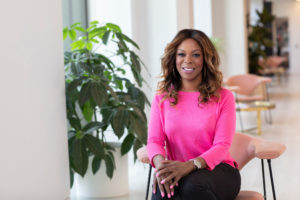For the penultimate profile in our Black History Month series, we spoke to Effie Kanyua, Director of PR & Comms at Hearst UK. She gave us her personal perspective on our industry’s progress to date towards achieving diversity and inclusion, and the key challenges and opportunities from this point forward.
Do you think the industry has a diversity problem?
Well if you look at all of the stories and you listen to what people are saying, I don’t think it’s any surprise that it has a problem. The problems have been around for years and years, but what the last few months have done is highlight how widespread the problems are. There are people who have been talking about it for years but the past month has lifted the lid and everyone in the industry is now being exposed to questions and we are getting greater insight that we can all work together to solve the problems. The problems are not only in PR but in publishing, marketing and finance – really across the board. The biggest lesson is now we know, we need to address it head-on and in a timely fashion.
What steps do you think we need to take to make the industry more diverse?
I think it’s a collective effort. There are obviously measures in place like BME Pros, the Blueprint that will hold people to account and make them look inwards and there is a responsibility for every business to look at what they do. At Hearst UK we had a Diversity and Belonging group set up and so we already have a commitment and a strategy that we have been working hard to implement. We have various pillars that ask, what does recruitment look like, how do we retain and how do we treat our people fairly, what does our content look like and how do we celebrate our people. As a result of Black Lives Matter we have made a first commitment to start a charter of key deliverables, which will hold us to account and every agency should be looking to do this. Without targets and without metrics, I don’t think we can change anything and everyone can do something in their business but it’s important to get started.
Do you think brands should be talking about the importance of racial diversity and if so what are the best ways to address the topic?
I think brands definitely need to address it because their audiences expect it and their staff expect it and we saw that at Hearst UK. The audiences of ELLE and Cosmopolitan were asking us questions about what we were dong as a brand and as a business so we can’t ignore this. We need to utilise the black talent within the organisation while at the same time acknowledge that you can not place all the responsibility on them. Listen to the talent within the organisation and if it is not there you need to look externally at bodies that can support you with your journey.
Don’t put out statements that you can’t live up to, be transparent and show support. I understand that it’s tricky for some people as they don’t want to speak up as they know they aren’t doing what they need to internally, but I don’t agree that you should stay silent. Be transparent. Brands can’t just post a black square and leave it at that. People will be looking at your brand and checking whether you follow through and people will start to call out people that haven’t followed through. There’s already talk about going back to see what companies have done and how they have moved forward over the last few months and if you haven’t done anything that will be obvious.
If you could sum up the reasons behind your success in a few sentences what would they be?
I would say passion for what I do because working in this industry is challenging and you can’t fake it- you have to love it or you will have to leave.
Working hard and learning from people in the industry who are the best at what they do and always looking for ways to improve the craft and ultimately deliver results. I would not be in the position I am in if I wasn’t able to deliver good results.
Relationships – pure and simple. I’ve worked really hard to build relationships with the people that I’ve worked with and that has to be at the heart of everything in this industry.
What has been the biggest setback in your career and how did you overcome it?
I don’t really think I see anything as a setback. The reason I fell into the job is because my job as a political reporter at the BBC fell through. So if that hadn’t happened I wouldn’t be in the industry. So with any setback you need to move forward and see it as an opportunity.
Can you recommend any schemes, programmes for young black women trying to enter the industry?
BME PRpros – 100%.
WIPR’s mentoring scheme.
Hearst UK who are offering seven paid scholarships, with travel expenses covered, as well as free shared accommodation for people wanting to get into media. Cosmopolitan have also just started a mentoring scheme.
There are several schemes available you just need to know which ones will support you in the best way.
What would be your advice to young females keen to enter the industry?
Look at schemes that can help support and grow you. I’m a huge believer in mentoring and it’s important to find good mentors in an official and/or unofficial capacity. I have had multiple mentors, both male and female, and as a female don’t always think the people you can learn the most from are other females. It’s who can help you grow the most as a person and tap into those resources. There are lots of things you can do yourself so look at bodies like CIPR or PRCA and see whether you can get training courses to help grow your skills.
Do you feel the Black Lives Matter protests have started to trigger real change in the industry or are people just paying lip service to the issue?
Some businesses have had a bit of a rocket and are moving full-steam – at Hearst UK we have been working at a fully-fledged charter that tackles this and hold us to account. There are other businesses that are doing the same. Some businesses have been motivated and this has given them the passion to move forward. Some businesses are slower. The thing that every brand needs to bear in mind is that now people will be looking at your brand more closely, so I don’t know how a brand can stand still on this without making some changes.





